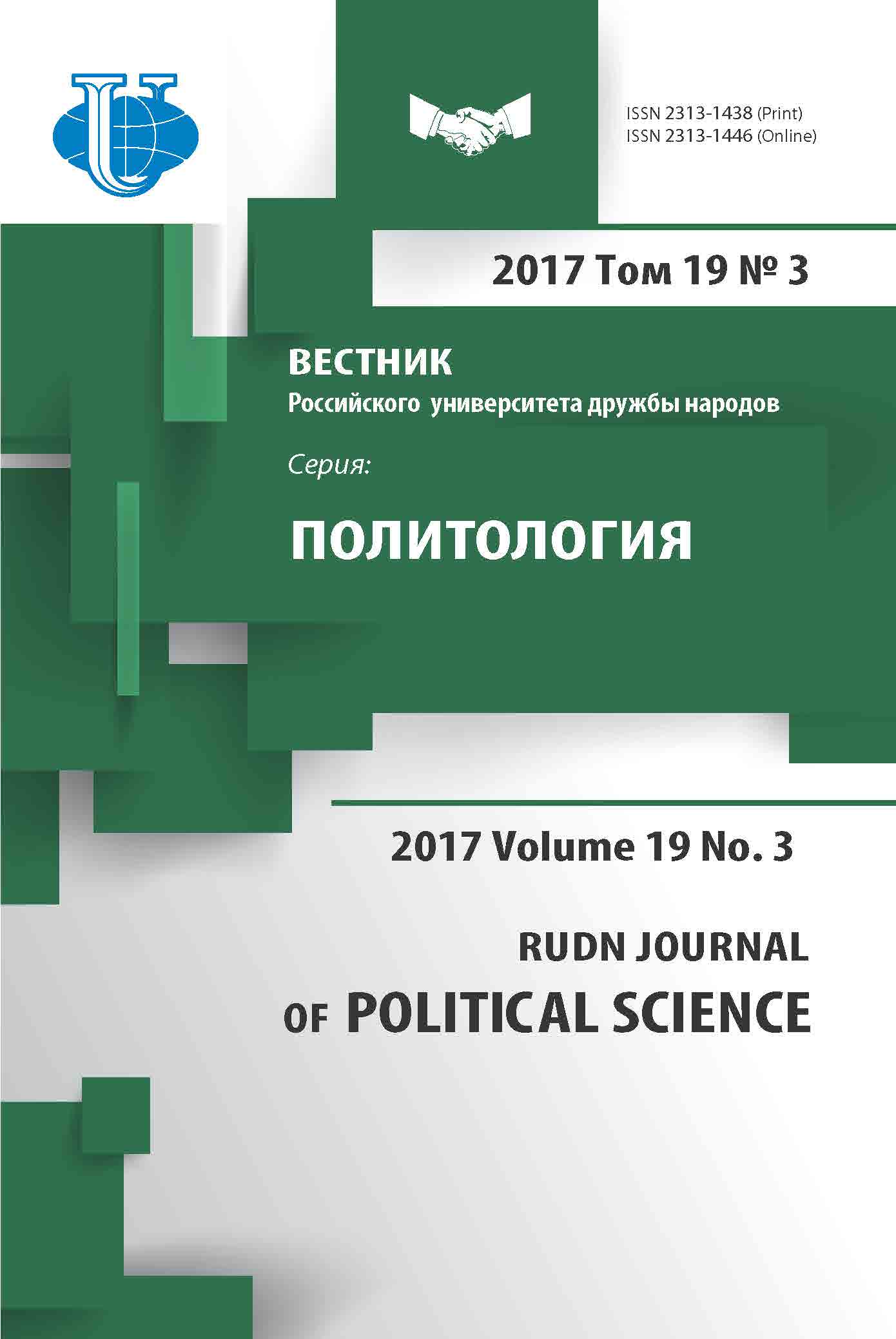THE DYNAMICS OF PEACEFUL RESOLUTION OF THE GEORGIAN-ABKHAZ CONFLICT (BEFORE THE AUGUST 2008 EVENTS)
- Authors: Lasariya AO1
-
Affiliations:
- Lomonosov Moscow State University
- Issue: Vol 19, No 3 (2017)
- Pages: 316-324
- Section: Articles
- URL: https://journals.rudn.ru/political-science/article/view/16974
- DOI: https://doi.org/10.22363/2313-1438-2017-19-3-316-324
Cite item
Full Text
Abstract
In this article, research attention is paid to the structure and dynamics of the peaceful resolu-tion of ethnopolitical conflicts in the Caucasus region (on the example of the Georgian-Abkhaz confrontation). The study takes into account the factors that were the catalysts of the escalation of the ethnopolitical conflict in the territory of Abkhazia. The collapse of the USSR and the collapse of the ideology of internationalism led to the need to develop a completely new identity. Most of the elites and socio-political movements of the post-Soviet period have focused on the formation of ideological structures from national and historical roots. In the last decade of the 20th century, the tendencies towards the realization of the right to national self-determination (in Abkhazia and South Ossetia) and on the other hand to maintain the territorial integrity of the state (for example, in post-Soviet Georgia) acquired an antagonistic character. An important political goal is to identify conceptual aspects of the resolution of the Georgian-Abkhaz conflict, which can be used as a basis for elaborating mechanisms for regulating ethnopolitical conflicts in the Caucasus region.
About the authors
A O Lasariya
Lomonosov Moscow State University
Author for correspondence.
Email: las.ain@mail.ru
Lasariya Aynar Otarievich - postgraduate student of department of Russian policy of faculty of political science of Lomonosov Moscow State University
Lomonosovskiy prosp., 27-4, 119991, Moscow, RussiaReferences
- Ahmetov A.A. Separatizm v Rossii i na postsovetskom prostranstve i puti ego preodolenija. Avtoreferat dissertacii kandidata politicheskih nauk: 23.00.02. M., 2013 (in Russ).
- Blishhenko V.I., Solnceva M.M. Krizisy i konflikty na postsovetskom prostranstve. Moscow, 2014 (in Russ).
- Diplomaticheskij vestnik. 1992. № 18 (in Russ).
- Diplomaticheskij vestnik. 1992. № 20 (in Russ).
- Konflikty v Abhazii i Juzhnoj Osetii (dokumenty 1989—2006 gg.). Sost. M.A. Volhonskij, V.A. Zaharov, Ju.N. Silaev. Moscow, 2008 (in Russ).
- Lakoba S.Z. Abhazija-de-fakto ili Gruzija-de-jure? Slavic Research Center. 2001. Available from: http://apsnyteka.org/104-Lakoba1.html (in Russ).
- Markedonov S.M. De-fakto obrazovanija postsovetskogo prostranstva: dvadcat' let gosudarst¬vennogo stroitel'stva. Erevan: Institut Kavkaza, 2012 (in Russ).
- Markedonov S.M. Turbulentnaja Evrazija: mezhjetnicheskie, grazhdanskie konflikty, ksenofobija v novyh nezavisimyh gosudarstvah postsovetskogo prostranstva. Moscow, 2010 (in Russ).
- Musaeljan L.A. Ob odnoj kollizii v mezhdunarodnom prave i vozmozhnom sposobe ee razre¬shenija. Vestnik Permskogo universiteta. Juridicheskie nauki. 2015; 2 (28) (in Russ).
- Samutina O.S., Jumatov K.V. Evropejskij Sojuz, Rossija i gruzino-abhazskij konflikt (1992—2015 gg.) Vestnik Kemerovskogo gosudarstvennogo universiteta. 2015; 3(63) (in Russ).
- Sljadneva G.V. Gruzino-abhazskij konflikt: genezis, sovremennoe sostojanie, perspektivy ure¬gulirovanija (politologicheskij analiz). Dissertacija kandidata politicheskih nauk: 23.00.04. Moscow, 2015 (in Russ).
- Tishkov V.A., Shabaev Ju.P. Jetnopolitologija: politicheskie funkcii jetnichnosti. Moscow, 2011 (in Russ).
- Tuzhba Je.N. Abhazija v globalizirujushhem mire: sociologicheskij analiz. Moscow, 2011 (in Russ).
- Hintba I.R. Osnovnye jetapy peregovornogo processa (1992—2008): jevoljucija podhodov i analiz rezul'tatov. Transformacija gruzino-abhazskogo konflikta: pereosmyslenie paradigm. Suhum, 2011 (in Russ).
- Shamba S.M. Peregovornyj process: nadezhdy i razocharovanija. Abhazija — Gruzija: Prepjat¬stvija na puti k miru. Suhum, 2000 (in Russ).
















